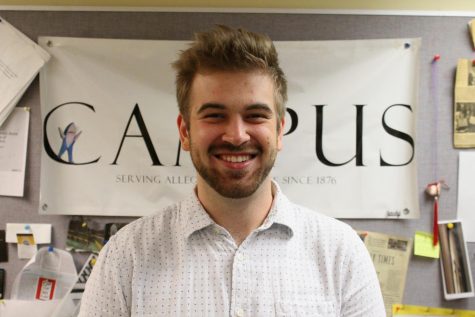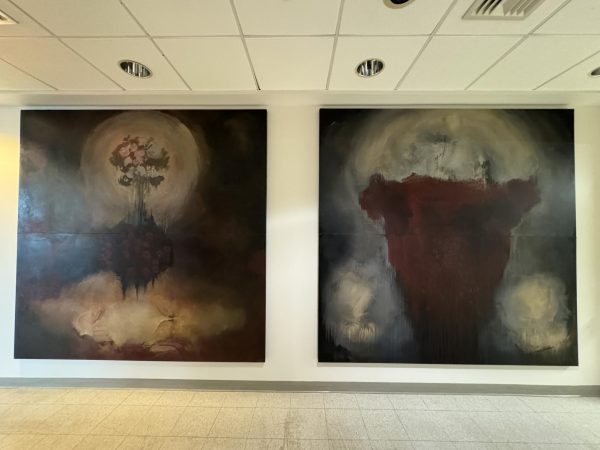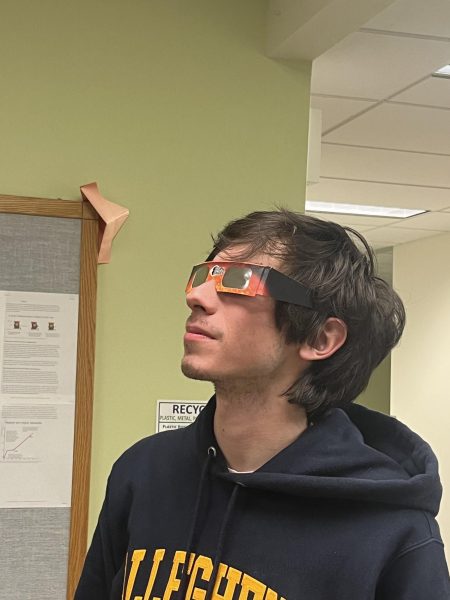COVID-19 associated with decline in carbon emissons
As people across the globe stay home, air quality improves
As much of the world stays home waiting for the COVID-19 pandemic to run its course, a silver lining has slowly begun to reveal itself.
With factories closed, planes grounded and cars parked in driveways for the foreseeable future, many regions and countries are reporting drops in carbon emission levels. Colleges and universities that have made the decision to finish the school year online are seeing similar effects, including Allegheny College.
“I’m not sure there’s a whole lot of confident and concrete things I can say on the topic yet,” said Sustainability Coordinator, Kelly Boulton in an email to The Campus. “There’s been some discussion of this amongst sustainability professionals. However there’s no consensus on what the overall impact might be since we’re still so solidly ‘in it’ and don’t have data to quantify anything yet.”
Boulton said that working remotely greatly decreases Allegheny’s emissions generated by students, faculty and staff.
“Think of all the reduction in personal travel by vehicles,” Boulton said. “On campus, we’ve been careful about ensuring our vacated buildings have minimal energy use during the time our campus is closed.”
Although declining emissions create visions of a cleaner future, the waters are still murky, according to Boulton.
“It’s too soon to say how significantly our energy reduction during this time will impact our overall annual greenhouse gas emissions,” Boulton said.
Professor and Chair of Environmental Science and Sustainability, Eric Pallant indicated that reductions in emissions will likely be minimal.
“I don’t see a permanent decline in emissions, even if this were to continue through next year, but in the short term, it’s going to be really good for the environment,” Pallant said. “There’s no question that air quality is improving all over the world, and so long as the global economy is depressed, we will see drops in air pollution and drops in carbon emissions, no question about it.”
The swift reactions by governments around the world in response to the pandemic gave Pallant hope that a similar reaction may be possible in the impending event of a climate crisis, but he still believes it will not be enough.
“The push already from protests in major cities in the U.S. to reopen the economy amidst what they perceive as an invisible health threat is certainly going to persist after this and with respect to climate change,” Pallant said. “It’s going to take total reorientation to prevent climate change, and if you know anything about our current president, it’s not going to happen on his watch.”
While media outlets publish updates about environmental benefits due to travel restrictions, Pallant sees this as more of a public need for good news, rather than a push for greener energy.
“I don’t see more than a handful of people on the fringe who are trying to connect the COVID crisis and the climate crisis,” Pallant said. “They’re really separate in people’s minds, and the order of events is we have to stop the COVID crisis, then we have to restart the economy, then we’re back to normal.”
Although the economy and the climate crisis seem unrelated to citizens, Pallant sees connections.
“The Trump administration is using the crisis as coverage to roll back additional standards like the mercury standard,” Pallant said. “I don’t know that it’ll have a big impact on the negative side, but (the environment) will be good for another year or two because the economy’s going to collapse.”
Some groups are seeking methods to go beyond the current emissions projections, which seem to suggest a dramatic spike in emissions once the economy regains its footing, and set the groundwork for a more carbon-efficient society.
“The most interesting proposals to jumpstart the economy is from those saying, ‘let’s take this opportunity to build green infrastructure and green energy sources going forward,’” Pallant said. “Again, I’m not optimistic that’s going to happen, but those ideas are out there and those are the best solutions.”
Pallant believes that, had the events leading up to the current pandemic played out differently, the immediate future may have had a different outcome.
“The thing is, the price of oil and natural gas, which are the competitors, are lower than they’ve been in decades,” Pallant said. “Just before we entered this mess and before Saudi Arabia and Russia got into a price war over oil, all the evidence I’m seeing is that solar and wind were increasingly competitive. That the price of solar and wind were similar to that of oil and gas. So if the price (of oil) comes back — and it does, it’s always been cyclical on a two-to-four-year cycle — I do expect wind and solar to continue to build, but I don’t think it’s going to be because of (COVID-19).”
Although the costs of renewables are becoming increasingly competitive with their non-renewable counterparts, the continued effects of COVID-19 on the economy strain the financial investments required for greener energy.
“I don’t see people having additional capital to make investments in renewable resources,” Pallant said. “My intuition is, people will go with what’s least expensive, period. So you’re not going to come up with another energy source in the short term that’s going to be cheaper than oil and gas.”
While investments in renewables are not the most financially feasible as of now, there are still ways to contribute to bettering the environment throughout and beyond the COVID-19 crisis.
For example, Joel Zove, ’23, is the leader of Allegheny’s chapter of the Sunrise Movement, a political movement which seeks to educate the youth about climate change and motivate them to take action.
“I’d suggest that students look into what groups are in their local area so they can help out,” Zove said in an email to The Campus. “I’d also look into Sunrise School, an opportunity to learn more about environmental organizing.”
Zove held a view similar to Pallant’s amid the crisis.
“It’s not that humans are the virus, it’s the corporate greed that’s causing the problems,” Zove said.
As one of the first colleges in the nation and the first in Pennsylvania to achieve carbon neutrality, Allegheny, like much of the world, is trying its best to continue its sustainability efforts during the COVID-19 pandemic.
“Right now, I think we have intentions to minimize our consumption and related emissions as much as possible, but only time and data points will tell what exact impact that has,” Boulton said.
As the pandemic evolves overtime, Pallant sees one event that he believes could effectively combat climate change.
“The outcome really lies on the (2020 Presidential) Election,” Pallant said. “If the democrats take the presidency and the senate, you’ll see all kinds of changes. If Trump’s base holds, it’s going to be five more years before we can see much change.”

Roman Hladio is a senior from Wexford, Pennsylvania. He is studying English with a creative writing emphasis, and completing requirements for a Journalism...




